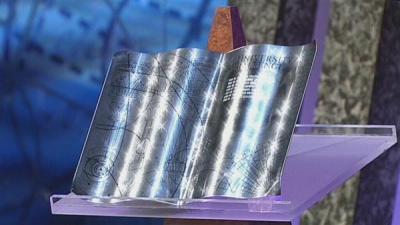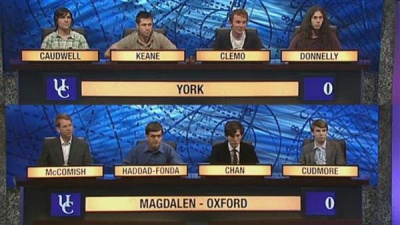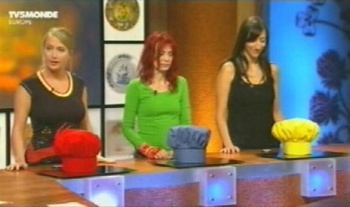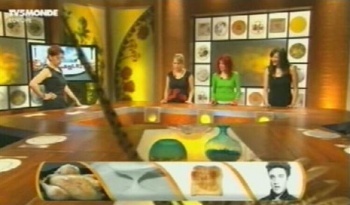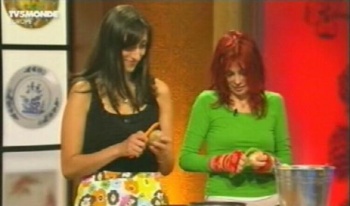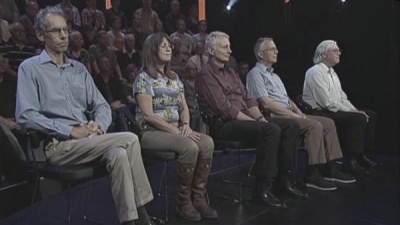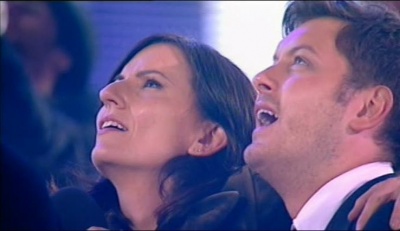Weaver's Week 2011-04-10
Last week | Weaver's Week Index | Next week
Last summer, we noted how daytime television seemed to have been colonised by cookery-and-lifestyle shows. This week, we'll look at a primetime quiz about cookery, but one where no-one will be baking anything. But first, there's a trophy to award.
Contents |
University Challenge
The Grand Final: York v Magdalen Oxford
It's come to this. Nine months – less a day – since the series began, we're going to find out the 2011 University Challenge champions. Both York and Magdalen Oxford managed to lose their first quarter-final, but battled through the extended phase, and respectively overcame well-fancied Sheffield and Peterhouse Cambridge to be here tonight.
A foreign monarch who shared his reign with Elizabeth I gives York the first starter, and they're getting the weekly Little Billy Shakespeare question out of the way early, with writings about him. Magdalen get off the mark with a biography of Egon Ronay, and their bonuses prove they know a composer's Handel. Dates as times give York their second starter, and the bonuses are on game theory, including proof that Trust Me was a version of the Centipede Game. We're into the first visual round – unusual names for European cities, and Magdalen has the lead 50-30.
"Florizel Street" is the subject of the next starter, but that's not on the other side at the moment – apparently, their transmitters are off air. We can wish! Elements predicted by Mendeleyev advance Magdalen's score further, as does Thumper declaring correct an answer that bears little resemblance to the alternative he gave. Poetry quotations move their score a little, and they win a fingers-on-buzzers question about three words sharing a four-letter ending. Conifers prove more fertile for the Oxford side, and they're running away with it a bit. No-one knows T S Eliot, but Magdalen knows fixation, and they progress with writings on theology. York get a missignal on a musician-chemist, Magdalen pick it up, and do well on questions comparing the speed of light and sound.
The audio round is some harpsichord music. Scarlatti? No, J S Bach. Magdalen lead by 140-25. Two cities in northern Europe with a double-A? Aachen and Maastricht finally give York a starter, but they're not so hot on naming keyboards from their sound. The tea tree is another missignal for York, and Magdalen go on to fumble questions about monarchs with a common forename, described by their regnal number and nickname. The mere mention of "The Structure of Scientific Works" is enough for Magdalen to pick up their next starter, and the works of Keynes gives them perfection.
But York pull back with the epiglottis and conductors of orchestras. No mention of Sue Perkins, regrettably. Can anyone work out 44? Evidently not. What's the only word beginning "unz-"? Magdalen know that, and get bonus questions on rhyming place names, and we have a nasty feeling that that's Game Over.
The second visual round asks for the painters of two pictures, but no-one has it. Magdalen's lead is 200-50. York know about sweet Hungarian wine, and that gives them works of Turner with the artists who inspired them, a question itself inspired by an exhibition in London last year. The Biblical character whose name is 10-9 backwards? Good question, ten more for Magdalen, who go on not to know about oestrogen, or indeed any other hormone. A rare gap in their knowledge. Literary rooms and taxes are the next combination for the Oxford side, but they know nothing about taxes. York pull back with Beijing, and the definitions of words in "Bohemian Rhapsody".
We don't pretend to understand the chemistry question Magdalen got, but they do get two on the solar system, then characters from "The Merry Wives of Windsor" and authors from the Granta New Authors List 1983. The career of Piaget, the Greek prefix "palin-" (which means again) go to Oxford, but neither side knows that NE and S postcodes aren't in London. Magdalen pick up another starter, but at the gong, they have won comprehensively, 290-85.
For the record, Andrew Clemo had four starters for York, they made 7/18 bonuses and two missignals. There were seven starters each for Kyle Haddad-Fonda and Will Cudmore, Magdalen were right in 26/45 bonuses, and overall accuracy was 55/90.
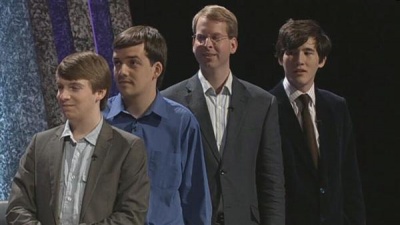 James McComish, Kyle Haddad-Fonda, Will Cudmore, and captain Matthew Chan represented Magdalen Oxford.
James McComish, Kyle Haddad-Fonda, Will Cudmore, and captain Matthew Chan represented Magdalen Oxford.
The presentation is made by the historian and writer Antony Beevor. Magdalen made their early work look easy, defeating a useful Durham side by over 200 points, and leaping into a three-figure lead against Downing Cambridge in the second round. But then it slipped, Downing threatened a comeback, and Magdalen lost a close match in the deci-final round to Sheffield. They got their groove back against Christ's College Cambridge, and looked increasingly confident against Queens' and Peterhouse from the rival city. We noted that five Cambridge sides had made it to the second round – St John's lost a derby match, Newnham fell to Bristol, and all the others would lose to Magdalen.
Unlike some of the other winners, Magdalen have worked as a team – Messrs. Cudmore and Haddad-Fonda were like lightning on the buzzers, James McComish added some crucial starters, and while captain Matthew Chan didn't get many starters, he was invaluable on the bonus questions and in marshaling his troops. Truly, this was a victory for the Magdalen Oxford team, in this column's view the best all-round team to win the final in some years.
A Table
Zone3 / TV5.ca; shown on TV5 11am Saturday
The setting for A Table (which translates at "at the table") is ... a dinner table. Sitting down the sides are a couple of dozen guests, the audience for the programme. At the head of the table is Chantal Lamarre, the animatrice for the next half-hour's entertainment. She's joined by three celebrities from the world of Quebec entertainment – in one sample episode we saw, that's comedian Rafaëlle Germain, jazz-pop singer Florence K, and singer and actor Chloe Ste-Marie. Is there going to be a token man on the programme? We'll see.
Almost inevitably, the quiz begins with an excuse to meet the contestants, and there's a minute or so of animated conversation with each of them. Soon enough, the games begin. Round one is entitled "Cuisine 101", which translates as "101 kitchens". In this round, the hosts asks some multiple-choice questions, with three possible answers. On the buzzers, the contestants are to give the correct answer, or at least the one the researchers are looking for. Three points for a correct answer, one away for an error, and don't try to buzz before the host's read out all the options.
At this point, the show's one and only Special Effect comes into play. From the side of the table, a conveyor belt starts, and on it are three coloured chef's hats. The importance of these will be seen after round two, "Le Frigo", which translates as "A newspaper of record". From a stock of fifteen items, the contestants will pick five ingredients. They then have 30 seconds to improvise a meal using these ingredients, and any staples. It's a sort of Ready Steady Cook, without any actual cooking. But where do the coloured hats come into play? After all three contenders have set their menus, the guests gathered around the table hold up a hat to indicate which one they'd like to be eating. These hats are counted during the first commercial break, and 5 points are awarded apres les publicites.
Round three is another buzzer round, entitled "Dévourer des Yeux", which translates as "Eat something horrible". Four items are shown at the same time, three of them are ingredients and one is a famous person who might give a clue to the dish under discussion. Two points for each correct answer, purlease.
At the end of this round, the contestant with the lowest score is invited to start on a menial task that needs to be done, like peeling potatoes or the washing up. The remaining two contenders lose their scores, because they've qualifies for the next round, "Numero 5 pour deux", which translates as "Two people are watching the show on Channel 5. Cor, that's a hit!" In this round, players are given a one-word description of a question, and must decide whether to play or pass it. Whoever answers the question must give the right answer, or cede the point to their opponent. The first player to five points wins. This round reminds us of the famed Face á Face round on Questions Pour un Champion, and of the catchphrase "Essayes ne fais t'affoler pas!"
After the break, we can come back for the finale. By now, there are two losers peeling potatoes, or nervously keeping a look-out for Stéphan Nolan. The winner from the last round is given 90 seconds of rapid fire questions, and rewarded with $100 (about £60, €70) per correct answer. We assume that all of this is donated to a good and worthy cause, we didn't quite catch that. Might have been in the opening interviews.
From our view, A Table is perfectly serviceable television, it's a quiz about cooking but without any cookery involved. Chantal Lamarre plays a deft hand, keeping the show flowing, and ensuring there's lots of jollity and very little seriousness. There are plenty of silly sound effects and opportunities for jokes, and the majority of them are taken up by contestant or host – especially when it emerges that no-one can recognise "Chicken a la King" from the clues.
A British version would fit well in a tea-time slot if played by civilians, perhaps an early-evening slot for the inevitable celeb version. The one thing we'd insist on is keeping it brief, the format doesn't have all that much in it, and a 45-minute show would probably be too long.
Mastermind
Second round, match 6
Once more, to the final. Robin Seavill is taking "Unreliable Memoirs" of Clive James (b 1939). A native of Sydney, James was editor of the university's literary magazine. He moved to England in 1962, took a second degree at Cambridge, and eked out a living as journalist, reviewer, and cultural commentator. He was television critic for The Observer for ten years, and later hosted a television show about television around the world. His autobiography, published in three parts, is noted for prioritising the anecdote over the strictly factual. The contender's answers are strictly factual, and he finishes on 12 (0).
Min Lacey has the "Discworld" novels of Terry Pratchett (est 1983). The conceit of these works by Terry Pratchett is that the world is flat, and full of magic. To crib from the Hitch-Hiker's Guide to the Galaxy, "Pratchett takes various facets of our own mundane world such as Australia, rock'n'roll, high-energy physics, religion, opera, and fairy tales, and examines them through the distorting mirror of not only his inimitable sense of humour, but also of the Discworld's strong magical field. Just about anything with which we are familiar has a simpler and more satisfying explanation on the Discworld." The round itself feels like it fell a bit flat, ending on 8 (0).
Peter Watkins is going to tell us about "The Navy Lark" (1959-77). A radio comedy, set aboard HMS Troutbridge, "The Navy Lark" followed a simple formula: characters played by Leslie Phillips, Jon Pertwee, and Stephen Murray would get into trouble, and try to extricate themselves without Captain Povey finding out. There was a lot of putting on of silly voices, and Ronnie Barker (qv) appeared in many episodes. The show ran out of steam, the cast started dying off, and it's still played on BBC7, or whatever they're calling it this week. The contender achieves perfection. 13 (0).
Follow that! James Collenette takes the novels of Raymond Chandler (1888-1959). Chandler's seven books were crime fiction, with more realism and moral ambiguity than was customary for the early 20th century. His best-known creation is Philip Marlowe, the character's become an archetype for detectives. A pass at the end results in his score reaching 10 (1).
And finally, Paul Steeples will discuss Victorian churches of London (1837-1901). As London expanded in the 19th century, so the new population wished to worship. Many new church buildings were erected, some of remarkable architectural merit. A near-perfect round ends on 12 (1).
Min Lacey won on 24 September taking Charles M Schulz. She scores with the art of handwriting, the height of Kilimanjaro, and the sauce of salsa. She gets more right later in the round, but we can't help but think that 18 (0) won't win.
James Collenette is the last of our runners-up this year, he took Argentina Since 1800 way back on 20 August, the first heat. He gets Ukraine, Pearl and Dean, and David Cameron's constituency, but confuses A Question of Sport with The Nod Show, and doesn't remember the first Italian woman to win a tennis grand slam. Neither do we. 16 (2) is his final score.
Robin Seavill took the TV Plays of Alan Bennett when he won on 1 October. Professors "emeritus" and the spruce tree help him to get off to a good start, but he never looks relaxed in the chair. Not that that's stopping him from scoring, with kosher and Kon-Tiki and an alternate version of "King Lear" kicking up the kount to 22 (2).
Paul Steeples won with Charles Ives on 27 August. His right answers include pillion and walking and Beethoven's Pastoral symphony and the telephone. He confuses Lassie with Rin-Tin-Tin, but recalls Lilith and Clause IV of the Labour party constitution. It's a very good round, finishing on a very competitive 27 (2). That's just one place short of the repechage board from the heats!
The game is on for Peter Watkins, who won with Mark Anthony on 3 December. His correct answers include the cast of "The Sweeney", anvils in classical music, and where to go to find the Walloons. There's the Charing Cross, the Irish for "police", the ear-tuggers of Slovenia, and smelling salts. But there are a fair few incorrect answers, and the round needs 14 correct answers. Even with a dubious start, the contender can only reach 25 (3).
So Paul Steeples, a civil servant from London, has won the second-first and the second-last episode of this series. Join us next week for the grand final. He will!
This Week And Next
After months of speculation, Channel 5 confirmed that it will be saying a big "Hello!" to Big Brother. According to the press release, the show will return in August with a celebrity edition, doubtless featuring such massive celebrities as The Olympian who Finished 35th in the Modern Pentathlon in 2004, Bernie St John, That Bloke Out Of D:Ream (No, Not the Astronomer, The Other One), Someone Who Was An Extra in Family Affairs, and Eric Pode of Croydon. Then there's to be a non-celebrity edition running into December, before another bunch of celebs return in the new year. The programme is expected to be ignored in all good newspapers, and the Daily Mail. And, let's be honest, in this column as well – we made our peace with the show last year, and we want our last memory to be Davina and Brian watching the fireworks.
Had C5 told us of Big Brother's return a week or so after C4 brought the curtain down, it would have been timely. Had it been a few years, nostalgia would have kicked in. Now? They're falling between stools. Channel 5 is just about the only place BB could have gone at this point, it could have worked on ITV / ITV2 in a couple of years' time.
How will we know it's a hit? Ignore the press; given Channel 5's ownership by the Daily Express proprietor, it's certain to be criticised by the Murdoch press and by the Associated papers, because that's in their business interests. Between them, they have enough mindshare to make the whole thing appear a failure, even when it's not. This column has been looking at the ratings, and finds that 1m is about par for a C5 primetime show, 10pm goes slightly lower. We reckon that, by mid-series, the weekly average will be just below the magic million, say 950,000.
Why would Channel 5 buy the show? It's got a tightly-focused demographic, appealing very well to young people, better to women than men, and not at all to older viewers. Advertisers who know what they're buying will be able to take or leave the show easily. It gives Desmond's empire a talking point that might take the sting out of The X Factor and I'm a Celebrity... Get Me Out of Here! in the autumn – certainly it'll give an alternative discussion point for the twentysomething women. And it – finally! – gives the digital spin-off channel 5* a reason to exist, and that's something it's never had before.
Reaction from previous contestants on Tuesday night was interesting. Kate Lawler twittered, "Porridge, hot water, a bit of mixed dried fruit & a splash of golden syrup makes a lovely healthy breakfast. Yum." Keeva Guilfoyle said, "those wonderland girls are smoking!!!" "But," said Rex Newmark, Andrew Edmonds told the world, "Nah, I don't think I could ever embarrass myself on national telly". Brian Dowling wrote, "It is understood that the breach related to an incident involving the direct phone line used by Mr Justice Michael Moriarty", and Shabby Katchadourian said, "As we were gonna do our proper launch when my show comes out but it's been pushed back a bit... Erm... http://www.theapocalypseclub.com" Victor Ebuwa declared, "I wana go to 1 of Silvio Berlusconi's 'BUNGA BUNGA' parties! I dunno what it means but it sure sounds like my kinda party ;-)" while Ben Duncan expressed his pleasure at the national holiday declared for his birthday at the end of the month. Final word to Marcus Bentley: "Chickens."
The indisputably good news department tells us that Danny Baker is threatening to return to the airwaves next week. The broadcaster has been receiving treatment for cancer since last year, but we're reliably informed that he's now feeling much better, and is eager to provide something more entertaining than Steve Wright In The Afternoon.
It was "come and see what you could've done" in court this week. John Cooper is standing trial for two murders, committed in 1989. A month before, he had appeared on Central's famous Bullseye game show, and the court heard evidence suggesting that he looks exactly like a contemporaneous drawing of the suspect in the case. The trial continues.
Ratings for the week to 27 March show that Dancing on Ice went out with 8.5m viewers. That's clearly the most-seen game show, but almost a million down on the opening week back in January. Masterchef came second with 5.3m, and BBC1's Saturday night double of So You Think You Can Dance and Secret Fortune finished around 5m. Total Wipeout and Push the Button attracted 4.5m apiece. University Challenge was BBC2's most-seen show, 2.95m as York beat Sheffield; Monday teatime's Come Dine With Me was Channel 4's biggest with 2.4m. Celebrity Juice 1.36m, Come Dine With Me Daytime 770,000, Hell's Kitchen Us 675,000 are the top three on digital channels. UKTV Living remembered Jade Goody, as did 385,000 viewers, and 60,000 saw Cor Cymru on S4C.
This week's highlights is the Mastermind final (BBC2, 7.30 Friday, 8pm Scotland, 7.50 Saturday in Wales). The News Quiz returns (Radio 4, 6.30 Friday), and BBC1 formally presents its entry to the Eurovision Song Contest in Your Country Needs Blue (6.10 Saturday). ITV replies with Sing If You Can (7.20) and some show called Britain's Got Talent (8.20). And which will get the more viewers: a re-run of Codex from 2007 (C4, 2.35am Tuesday) or the final of Love Thy Neighbour (More4, 9pm Friday)? Don't forget to miss 'em!
To have Weaver's Week emailed to you on publication day, receive our exclusive TV roundup of the game shows in the week ahead, and chat to other ukgameshows.com readers, sign up to our Yahoo! Group.

